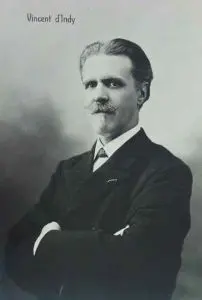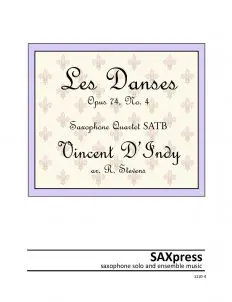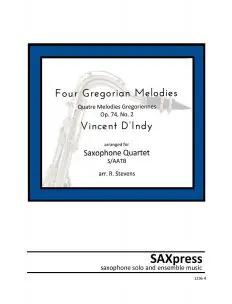Vincent D’Indy
Vincent D’Indy was a French composer and teacher. Vincent d’Indy was born in Paris in 1851 and became a pupil and leading disciple of César Franck, whose music he did much to propagate. He distinguished himself as a teacher, founder of the influential and rigorous Schola Cantorum, and writer on musical subjects, and was an important figure in the musical life of Paris in his time, although by the time of his death a new era in music was well under way. He was a co-founder of the Schola Cantorum de Paris and also taught at the Paris Conservatoire. His students included Albéric Magnard, Albert Roussel, Arthur Honegger, Darius Milhaud, Yvonne Rokseth, and Erik Satie, as well as Cole Porter.
Vincent d’Indy was born in Paris into an aristocratic family and from the age of 14, he studied harmony with Albert Lavignac. At the age of 19, during the Franco-Prussian War, d’Indy enlisted in the National Guard, but returned to musical life as soon as the hostilities were over. He entered Franck’s organ class at the Conservatoire de Paris in 1871 remaining there until 1875, when he joined the percussion section of the orchestra at the Châtelet Theatre to gain practical experience.
In the summer of 1873, he visited Germany, where he met Franz Liszt and Johannes Brahms. In 1876 he was present at the first production of Richard Wagner’s Ring Cycle at Bayreuth. This made a great impression on him and he became a fervent Wagnerite.
Inspired by his own studies with Franck and dissatisfied with the standard of teaching at the Conservatoire de Paris, d’Indy, together with Charles Bordes and Alexandre Guilmant, founded the Schola Cantorum de Paris in 1894. D’Indy taught there and later at the Paris Conservatoire until his death. Among his many students were Isaac Albéniz, Arthur Honegger, Darius Milhaud, Cole Porter, Albert Roussel, Erik Satie.
Few of d’Indy’s works are performed regularly today. His best known pieces are probably the Symphony on a French Mountain Air (Symphonie sur un chant montagnard français, also known as Symphonie cévenole) for piano and orchestra (1886), and Istar (1896), a symphonic poem in the form of a set of variations in which the theme appears only at the end.
Vincent D’Indy works available at SAXpress
Showing all 2 resultsSorted by latest



